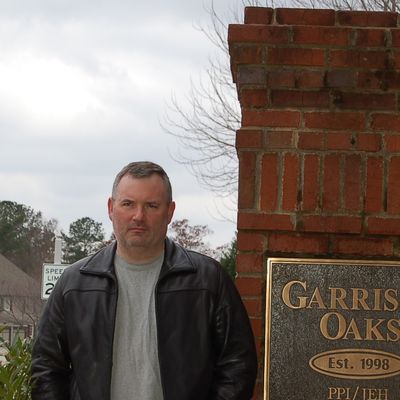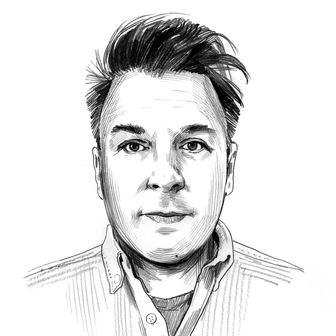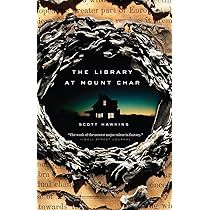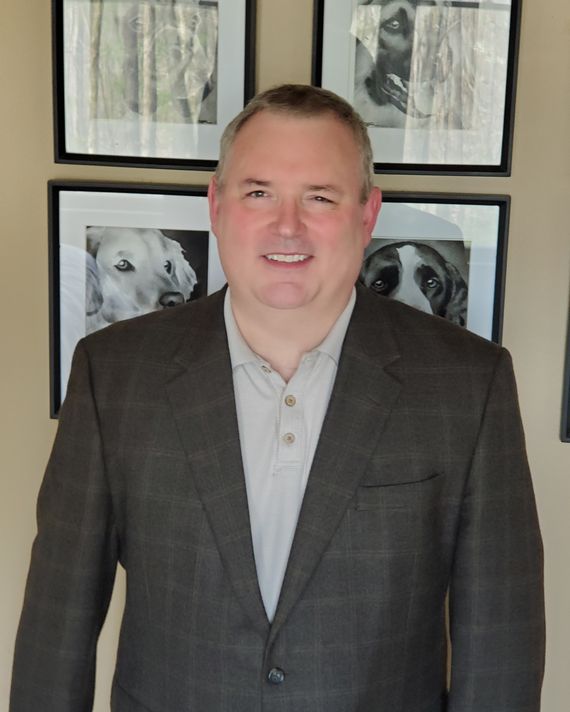
Scott Hawkins just turned 55 and has lived for the past ten years about 40 minutes outside Atlanta — drive north “until you see cows,” he says. After a brief stint as a teacher, he’s worked in computer stuff his whole life (he is the author of The Linux Desk Reference and Apache Web Server Administration).
But if you know of him, it is most likely because, nearly a decade ago now, he published a very well-regarded and well-read fantasy-horror-science-fiction book called The Library at Mount Char. (It’s about, in short, the overthrow of the god who currently runs our planet by one of his disciples, who are a group of children kidnapped/rescued from the same suburb.) If you go, as many fans have, in search of news of his next book, you may find his website, which looks like this:
If you click through, he tells you that there isn’t a next book— but that one is nearly done: “As I type this (August 2019) I am about three working days from having a completed draft.”
It is now October, 2024. What happened? I called him to find out.
You’d written books before The Library at Mount Char. They were technical books, mostly about Linux, but they were books. Then at some point in your life you started writing a novel?
Well, it was more the other way around. I’d done the technical books, but I had written three unpublished novels prior to Mount Char.
What happened there?
They just weren’t very good. One of ‘em I thought was kind of on the borderline, but in hindsight, not so much. Plus it was an animal story, which is a tough sell to the adult market. It was strictly from an animal point of view.
So you completed three novels and then you looked at them and thought, I can’t save this. I can’t fix this.
Yeah. It always sounds good in your own head, so you otherwise wouldn’t have put it down in the first place. But I sent it out to the agents and got basically no response. I should have just chucked it into the harbor, spared myself some embarrassment. Family and friends were like, “Well, it certainly is a book.” And then I did — the second one was a little better, and the third one was pretty close, I think. Guess that’s how I actually ended up with my current literary agent. She read it and she was like, “Well, this isn’t quite what I was looking for, but send me your next one.”
What was the first sort of image or idea or piece that became Mount Char?
The easiest one to talk about is the bit where — spoilers, obviously — there’s a character running through a neighborhood, and he’s attacked by a pack of dogs. And this actually happened to me. I was living in this little town, very rural Georgia. There was this kind of suburban stretch of land that wasn’t fully developed, and it backed up on a lot of woods. And for whatever reason, there was this pack of stray dogs that had either been abandoned or run away or whatever, and they congregated and there was 20 of ‘em out there, and they’d go through your trash at night. One day I’m out jogging with my dog and the stray dogs took issue with this. I think they probably could have caught me and killed me if they really wanted to, but I didn’t stick around to find out, so I just ran my ass off. One day I was kind of noodling around and I figured I’d jot that down.
Which then leads you to the suburbs, which leads you to your setting.
I was just trying to write, and I had a hiatus while I did day-job stuff. I was just writing down anything that sounded interesting without really having any kind of grand vision for it. Eventually I had enough stuff that all the dots started to connect. And then I went through and shaped it and chunked probably 60 percent or 70 percent of what I had on the page and formed a coherent story out of it.
You’re not a storyboard writer.
I really had a very time intensive day job. It was like seven days a week for a while. And so there would be periods of months where I wrote absolutely nothing, but I was still kind of chewing it over in the back of my head on my commute. So by the time I actually sat down to write, I generally had a pretty good idea of where I was going to be going that weekend. I was filling in the gaps as solutions occurred to me.
What ended up happening in the edit and publishing process that changed from your first draft?
The very first draft was not one I submitted. I showed it to my wife, and she’s notoriously — well, she’s very fair-minded. If she doesn’t like something, she’ll tell you. And that’s exactly what I need. I remember the first time she was reading it, she comes down the hall and she’s got this really surprised look on her face. She’s like, “It’s actually really good.” She’d read about two-thirds of it, and I started to relax, and she comes up a couple hours later, and she has the last third of it rolled up into a bat, and she swats me on the top of the head with it and was like, “This part sucks, you ruined the whole thing; go back and rewrite the ending.” So that draft never saw the light of day outside the walls of my house.
The agent, Caitlin Blasdell, actually liked it. (She also represents science fiction legend Charles Stross.) Did a lot of people look at it? What was the auction and buying process like for you?
Oh gosh. It was pretty quick. The agent contributed a lot that became fan favorites. You remember the walking iceberg and the guy with the tentacles; all those were put in at her suggestion. So we worked on that for a couple months. Then she sent it out — and you know how publishing is like, you wait and wait and wait and wait? This was like two days. She sent it out to five editors and got offers promptly. I was prepared to wait months, and then she mailed it out on a Thursday and then it was Tuesday or something when she tells me, like, “Okay, it’s sold.”
What was that process like with the editor Julian Pavia, then? (He also edited Ready Player One and The Martian.) Suddenly you’re in a new person’s hands.
I have absolutely no complaints at all about the editorial process. It was really a pleasure, and my editor had such insight into aspects of the story that I’d never thought about. I think he had a depth of experience from the editorial side of the table that really helped polish some of the aspects of the manuscript that needed work but also how to get rid of some stuff that just didn’t need to be there. I would’ve sworn on a stack of Bibles I had chopped every unnecessary word out of this thing. He managed to find and trim down stuff that I had a blind spot to. It just didn’t need to be there. He was absolutely right.
Eventually they’re like, We’re going to publish this book. What was that month like for you up to the publishing and then pub date? Was it quiet? Were you lonely?
I’m like a data-center guy. I kind of keep the machines running, rather than attend a lot of meetings and decide strategy. So I’m really more heads down and writing is by its own nature a solitary occupation. I’m not really one of these naturally charismatic people who is going to do a lot of self-promotion or whatever. So it was strange. It was definitely outside my comfort zone, but they were all, again, very pleasant. We did a lot of a stream of pre-publication interviews, and in the wake of it coming out had some follow-up interviews and that kind of stuff, features for websites and magazines and things like that. So it was a lot of work, but it was also sort of dream-come-true type stuff. When you’re lying there mourning the failure of your third unpublished novel, you tend to dream about, Well, what if so-and-so interviews me? Honestly, very pleasant.
Did you at any point decide that your book was a success?
I want to say “yes.” It seemed like I was kind of taking my cue from the agent and editor, and they both seemed relatively pleased with it, and I think I would’ve been able to detect if they were just shining me on. They both seemed fairly happy with it. It didn’t rock the world the way some books have, but it’s still plugging along. It’s been fairly steady for ten years now, I think.
Do you receive royalties from the book?
In fact, yes.
At what point did you think, Maybe I’ll do it again?
I immediately set out to write a follow-up unrelated to Mount Char. I had a false start and kind of abandoned that about halfway through. Julian spent all morning with me one day, which was very generous with his time, to point out that it just really just wasn’t working. So I kind of dropped that one and moved on to something else. I’m hoping to have something worth submitting in the next year or so, but I’ve been wrong before.
So you’re unafraid to face the fact that this might be unfinished novel No. 5 is what I’m hearing.
Yep. It could happen. I mean, I keep trying. I struggled to find a tone. I was in a weird head space when I was writing Mount Char, and I’m struggling to recapture that. I guess, without going into too much detail, I’d had a fairly big health scare and was like, Oh God, I could die at any minute. And I didn’t, obviously, but a little more mortal terror might be what I need at this point to finish out the next manuscript. For obvious reasons, it’s hard to get too enthusiastic about that.
I was going to say, that can be arranged, but … So some of the creativity was fueled by a terror.
I think Anthony Burgess wrote A Clockwork Orange and two or three other books in the three months following news of a fatal brain tumor that ended up being a misdiagnosis. Same kind of thing with me.
You never want the wrong fatal diagnosis. At some point you put up a thing on your website, it looks like around 2019, that says “Where’s the next book?” Were you going through some stuff?
I felt like, rather than waste the reader’s time, there probably was one reason they were Googling Scott Hawkins and they didn’t need to get through a whole page of stuff. They had probably one question. And I figured, we all got places to be.
That’s true.
Should probably update that however.
Well, not long after April 2019, things got more hectic. I wonder what was changing in the world for you in 2020?
Oh God, people are probably going to crucify me for this, but really not much. I’m kind of a borderline germaphobe and a recluse to begin with, so I didn’t really notice a whole lot of difference. I guess my main thing was that I was pleased to be able to wear a mask in public. That was nice, being socially acceptable. Always kind of wanted to do that.
And you work from home primarily, right?
Yeah, I have for nearly ten years now with the health-care company.
Do you get out a bit or do you not get out a bit?
I mean, every now and then. Not like I never leave the house. It’s not a Howard Hughes kind of thing, but I don’t have what I would call an active social life. I got a couple of friends that we hang out with locally and go to dinner, just never been super-social. I’m just one of those people.
I get it. Everyone’s like, “Why don’t you want to travel?” And I’m like, Why would I do that?
I did enjoy travel for a time, but until fairly recently, we had a lot of dogs in the house, we were working with an animal rescue. The long-term residents peaked out at about seven, but I think we’d had up to 16 at one point. Somebody came with puppies, so we had just a lot of dogs, and it’s tough to make travel arrangements. Anybody out there reading, if you’re thinking about doing that, even if you’ve got a big place, stop at four. It’s just too many. But they were all about the same age, and they’ve recently moved on to greater glory, and it’s enjoyable having a quiet house for the time being.
And you’ve tried on ideas about a sequel, but you’re very conscious, I think, of how dangerous it is, and how badly sequels can go.
I am actually. That’s one of the things I’m really chewing on, whether I want to pick that up. Because I’ve got what feels like a good first and second act for the thing, but I’m struggling to come up with a way that the finale wouldn’t be disappointing in light of the original Mount Char. I don’t know. Maybe? But yes, I think we can all agree that many sequels are just cash grabs and I don’t want to do that.
Are there sequels or adjacent universe buildings that you really like that you read or watch?
Well, Breaking Bad and Better Call Saul is the canonical example. I was a huge fan of both. And I actually have a few short stories — the other librarians had little side stories, a lot of which ended up on the cutting-room floor, but they hadn’t left my head and it crossed my mind if I get enough stories together, I might see if there’s any interest in publishing that, because I do get a lot of follow-up interest from readers. I think I’ve got three of them on paper and the wife thinks two of them are okay.
She really is your first reader. She’s serious. That’s pretty bold in a marriage.
I appreciate it. Her actual job is managing software engineers — well, not managing, but calling them on their bullshit, I guess. So from day one, she saw right through me.
It sounds to me that you feel very at peace with all these sort of murdered novels around you, which I find a little surprising.
At peace is probably a little strong, but I don’t want to wail and gnash my teeth too much. I mean, they were all frustrating, some more than others. I’ll be honest. My expectation was that once you passed a certain level of skill or whatever in your writing ability, everything thereafter would be relatively easy. And that, in my case at least, turned out not to be the case. A couple of people who have the same editor as I do have gone on to have much greater success. And so it’s hard not to be mindful of that. I’m not entirely at peace with it. That would not be a fair characterization. But it is what it is. And I’m happy. I really am sincerely glad to have gotten this far. And if that’s as far as I ever get, I can live with it. I guess I’m not giving up, but I’m trying not to let it drive me crazy either, if that makes sense. Yeah, that was on the table for a while.
It is a good choice not to go crazy.
I agree. Well, it was just really frustrating. These things are a big investment of time and to have not one, but two of them that might otherwise have had a reasonable expectation of success — probably arrogance on my part — but still, many times an author who gets published once can get published a second time. And so far, I just haven’t come up with anything that anybody agrees is worth pursuing. And I’m trying to remedy that, but it hasn’t happened yet. So that’s kind of where I’m at.
A kind person would certainly tell you that with writing, you got something out of each of these things that you’ve written over the years. Every word you’ve written, you’ve learned something.
And it’s fun. I don’t think any writer who does it for more than 20 minutes doesn’t get something out of just the process. There’s not any guaranteed reward at the end, if you’re not enjoying it in and of itself. Even with a successful novel under my belt, I think if you divided the hours spent writing over the years, I would’ve been better off waiting tables, but it’s kind of enjoyable. And I will say writing Mount Char was the most fun I’ve ever had doing anything. If I could do one experience in my life again, that would be it. And I’ve had a pretty good run, but that really was it.
Do you write in the morning?
Most of Mount Char was written between 2 a.m. and 6 a.m. I did that for a long time. It’s not really practical to live that far out of sync with everybody else in the household and the working world. But we had a lot of dogs at the time, and the house was quiet. So I’d get up, make my coffee and do that, and then I was in bed by eight o’clock every night.
Were you ever approached about adaptations or stuff from Mount Char?
The rights are out there, and I’m curious to see what happens if anything with it. It’s been optioned a couple of times. Nothing has materialized so far, but we live in hope. It could happen.
It does seem to be extremely adaptable material.
Your mouth to God’s ears. I think part of it is that there’s only one of ‘em. It seems like the stuff that actually gets picked up has potential for five seasons or whatever.
So the financial pressure to make a sequel is not just marketing and maybe publishing and also the option world, right? And also us readers — we also think we want that too, even if maybe we don’t in the end.
Yeah. It’s a tough call and I really do itch to get back to that mental space where I was so happy. The way I thought about it at the time was — you’ve seen those villages in Australia where it’s just a mountain and it’s so hot that the only way to live is you carve your house into the side of a mountain and live in there? That’s kind of what writing a new book is like to me. You carve your own house, you start with this blank wall, there’s just nothing there, and you carve out a little ballroom or whatever, and then you stage a party and see if anybody wants to come to the party. That’s the publication process. So there’s a temptation to have another party in the same ballroom, as opposed to creating another thing from whole cloth, which I’ve had mixed results with. We’ll see.
What else should I ask you about?
Well, here’s one thing. I’m a big Stephen King fan. And I feel like in studying his work, the stories that I find the most satisfying in the end, The Shining and The Stand, seemed to come from a place where he was going through a period of personal development. I would argue that The Stand in particular was a lot about him losing his mother at a relatively early age. I’m just speculating here. And in The Shining, he was coming to terms with the fact that he was maybe drinking too much. And I tried to put that into Mount Char. My relationship with my dad was a little bit rocky — not bad exactly. We went through probably more than the usual teenage headbutting kind of thing. But before he died, we became what I would consider very good friends. We really got pretty close. He’d always been kind of a scary guy. He had a very stern presence. But I noticed one day when I was about 25 that he was actually a very funny guy as well, and he had a really dry sense of humor that I had just genuinely never noticed for the entire preceding two decades. It put my entire childhood into a different perspective. So I wanted to put that in the book.
Are you going to retire someday?
Yeah, I am. I don’t have an actual date set, but let’s say ten years–ish.
When you put it like that, it sounds like a really long time.
I dunno. I’m hoping to live that long. I had about a year off after Mount Char sold where it was quasi-retirement. I didn’t do much besides write. And honestly, I got really bored. I did. It was kind of the dream come true, but I’m not really hankering for it. I like the job I’m doing. I like the people I work with. The work itself is interesting. Doing technical stuff during the day, and then, on evenings and weekends, I can catapult myself into the land of bullshit and have just a fantastic time there.
So you had that thing that everyone thinks is the dream. You published a book, it was well reviewed, it was selling, your agent and your editor were happy, you weren’t working, and you were puttering around feeding and walking the dogs and writing when you wanted to.
Yep.
How long was it fun for?
About two weeks.
What did your wife think of you after a month of you not working and just being around writing?
She was sick of my crap. She wanted me to figure out something to do.





